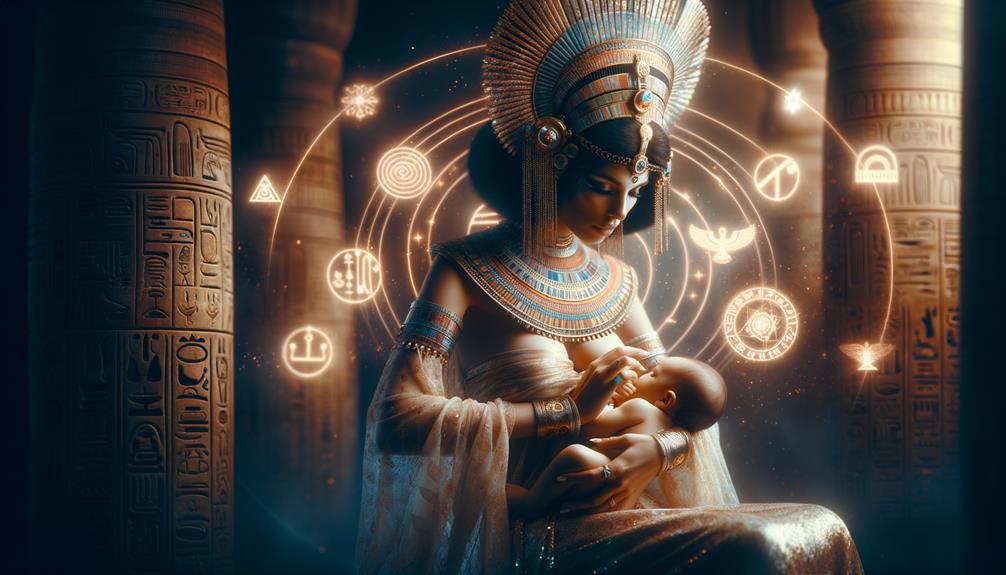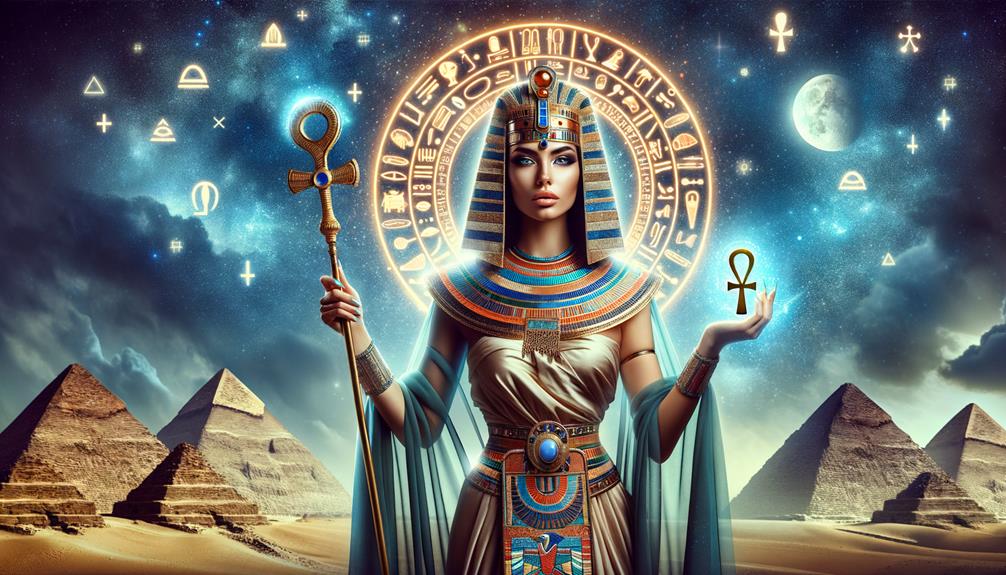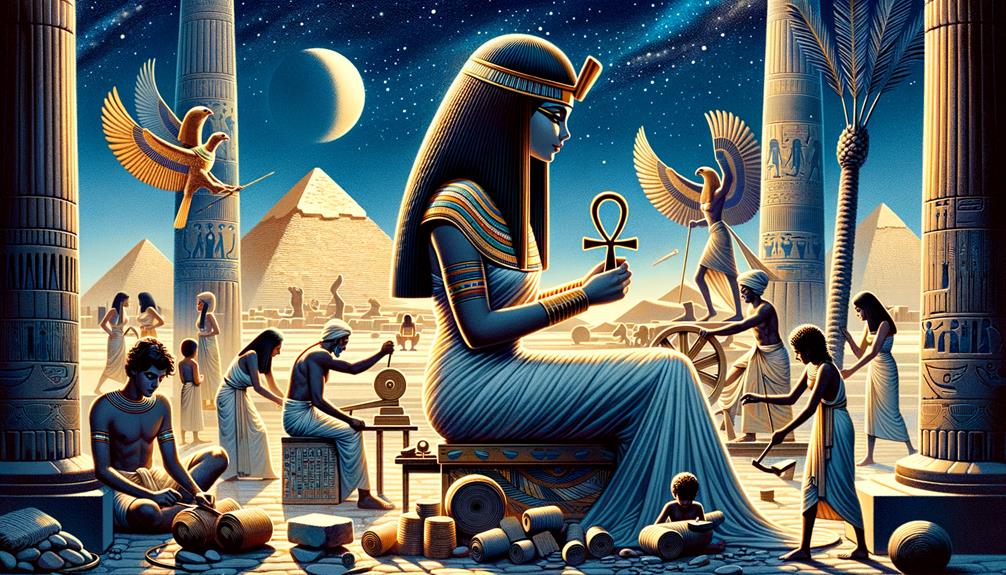When it comes to Egyptian mythology, Isis stands out, doesn’t she? She’s this fascinating figure, a mother and a magician all in one. It has been my pleasure to study her in depth, and every time, I find myself fascinated by her dual role. She’s nurturing, yet she’s also got this amazing power of magic. That’s not something you see in every deity, is it? But why is Isis so special to the pantheon? How did she shape the beliefs of the ancient Egyptians? Let’s dive into her story together, unraveling the myth and history to understand Isis’s lasting impact.
Unveiling Isis: Origin and Mythology

Let’s take a journey back in time to the era of ancient Egypt, where we meet a fascinating character named Isis, also known as Aset or Eset. This significant goddess, who is an emblem of motherhood and magic, has a name that translates to ‘throne’ in Greek, underscoring her nurturing and royal nature. She’s an essential part of a divine family, being the daughter of Geb and Nut, and sister to Osiris, Seth, and Nephthys.
In the myths and legends of ancient Egypt, Isis was celebrated for her supernatural healing abilities. It was believed she could alleviate sickness and even bring the deceased back to life. Viewed as an exemplary figure, Isis was recognized for her perfect motherly virtues, focusing on providing care and compassion.
Isis: The Goddess of Motherhood

Let’s chat a bit about Isis, the mother goddess. In the heart of motherhood, Isis stands tall as a celebrated figure. Her motherly love and protection towards her son, Horus, is a testament to the importance of family and motherly instincts in Egyptian society. You’ll often see her in art, nursing Horus – a clear sign of her divine care. This image of Isis, with Horus at her side, speaks volumes about her divine role as a guardian and provider.
Let’s break down some of the maternal traits Isis embodies:
| Trait | Explanation |
|---|---|
| Nurturing | Isis offered divine nourishment to Horus. |
| Protective | She fiercely defended her son, showcasing strong motherly instincts. |
| Provider | She ensured all of Horus’s needs were met, embodying the role of a mother. |
| Feminine Role Model | Isis epitomized feminine traits and virtues, serving as a role model. |
Magic and Mysticism: Isis’ Powers

Let’s take a closer look at the mystic side of Isis, an ancient Egyptian goddess. Known far and wide for her motherhood, Isis also held a high place of honour for her extraordinary healing magic. Her magical prowess was so great that it put her a cut above other deities, earning her the title of the ultimate magician.
Isis’s magic had several aspects:
- She could heal the ill and communicate with the departed,
- She provided protection and guidance to those who sought it, and
- She was a safeguard against evil influences.
Depictions of Isis often show her as a magical healer, hinting at her deep impact on the religious customs of ancient Egypt. Temples dedicated to her reveal how central she was in rituals that called upon her powers, solidifying her standing as the Egyptian Goddess of Magic.
Isis in Ancient Egyptian Society

Isis held a central position in the ancient Egyptian society. She was the very essence of motherhood and magic, commanding a deep influence that echoed throughout the culture and everyday life. As the mother of Horus and the wife of Osiris, her caring and safeguarding traits were deeply respected. Her mystical healing powers were thought to bring relief to the sick and even bring the dead back to life, amplifying the respect she commanded. Isis was a figure of inspiration, encapsulating the perfect example of motherhood and female power. She emphasized the significance of family ties and kinship in ancient Egypt, underlining the societal importance of these relationships. In essence, Isis’ part in ancient Egyptian society was critical, her influence seeping into every part of life, solidifying her as a timeless symbol of motherhood, magic, and power.
The Enduring Legacy of Isis
The lasting influence of Isis, from her time in ancient society to the present, is marked by her representation as the quintessential Egyptian mother and a figure of magic. Her role as a symbol of safety and care continues to echo in our collective memory.
Let’s break down her long-lasting impact into three main areas:
- Isis is often remembered for her healing abilities, a magical skill that has cemented her place in mythology as a respected character.
- Society places great importance on Isis due to her depiction as the ultimate Egyptian mother. Her nurturing nature, typical of a maternal deity, further accentuates this.
- The ongoing reverence and devotion to Isis is a testament to her enduring legacy.
In a nutshell, the long-lasting effect Isis has had on society, culture, and mythology can be seen in her roles as a guardian, a provider, and a magical entity.
Frequently Asked Questions
Who Is the Egyptian Goddess of Motherhood and Magic?
You know, I’ve spent a good amount of time studying the Egyptian goddess who is the embodiment of motherhood and magic. She’s a pretty remarkable figure, representing the perfect model of motherhood and renowned for her healing abilities. This goddess held many important roles – as a protector, a healer, and a wise queen. Quite fascinating, don’t you think?
What Magic Did Isis Have?
You know, Isis had some pretty incredible magical skills. She was known for being able to heal the sick and even bring the dead back to life. Plus, she had this protective magic that people sought her out for. It’s safe to say her magical prowess was top-tier, even among other gods and goddesses. That’s why so many people turned to her for help and healing.
Who Is the Egyptian God of Motherhood?
When you delve into the intricate world of Egyptian mythology, it’s fascinating to discover Isis as the goddess who symbolizes motherhood. Her endless dedication and nurturing love for her son, Horus, make her the perfect embodiment of what an ideal mother is.
What Is the Symbol of the Mother Isis?
Did you know that Mother Isis, a key figure in ancient Egyptian culture, is often symbolized with her son Horus at her breast? This image isn’t just for show, it carries a deep meaning. It symbolizes the nourishment she offers, which isn’t just physical but divine in nature. This image paints a picture of her as a nurturer and protector, roles that were held in high esteem in their society. It also underscores the importance they placed on familial bonds and motherly instincts. Pretty fascinating, isn’t it?
